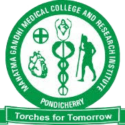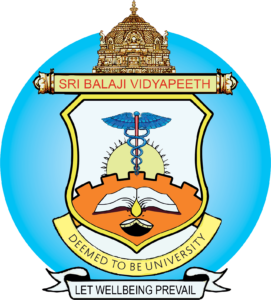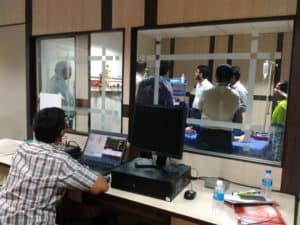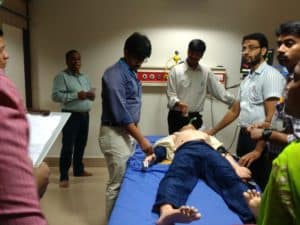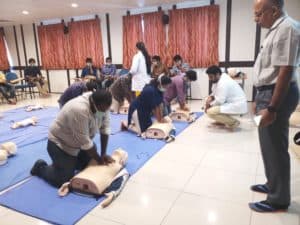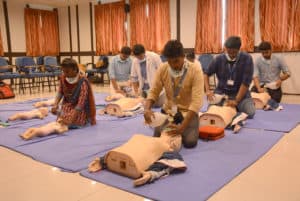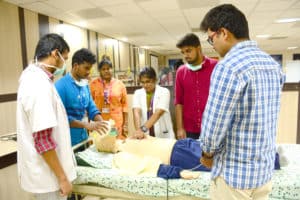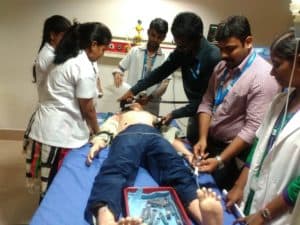Medical Simulation Center




Courses
1. Life support courses
AHA provider courses:
a. Basic Life Support (BLS)-1day course
The Basic Life Support (BLS) Provider Course.BLS is the foundation for saving lives after cardiac arrest. The participant will learn the skills of high-quality cardiopulmonary resuscitation (CPR) for victims of all ages and will Practice delivery of these skills both as a single rescuer and as member multi rescuer team. The skills you learn in this course enable you to recognize cardiac arrest, activate the emergency response system early, and respond quickly and confidently.
b. Advanced Cardiovascular Life Support Course (ACLS) – 2days course
The Advance cardiovascular life Support (ACLS) provider course is designed for healthcare providers who either direct or participate in the management of cardiopulmonary arrest or other cardiovascular emergencies. Through didactic instruction and active participation in simulation cases, students will enhance their skills in the recognition and intervention of cardiopulmonary arrest, immediate post-cardiac arrest, acute arrhythmia stroke, and Acute Coronary Syndromes (ACS)
The goal of the ACLS Provider course is to improve outcomes for adult patients of cardiac arrest and other cardiopulmonary emergencies through early recognition and interventions by high-performance team.
c. Pediatric Advance Life Support(PALS)
The Pediatric Advance Life Support (PALS) provider course is designed to give students the opportunity to acquire, practice, and demonstrate proficiency in the assessment and management of critically ill pediatric patients. The Primary educational methodology used in the course is that of simulation, whether for skill acquisition, complex medical decision making or teamwork. Other modalities used as video demonstration and group discussion.
Non AHA Courses
Basic Life Support (BLS)-4hours
Non AHA BLS provider course designed for Healthcare and Non health care workers. In this course the participants will learn about BLS survey which includes High Quality CPR for adult, infant and Pregnancy victim and also use of AED.
Advanced Cardiovascular Life Support Course (ACLS) – 1day
Non AHA ACLS Course designed for health care worker in this course the participants will learn about Peri-arrest Megacode team resuscitation concept and cardiac arrest (shockable and non shockable) Post cardiac arrest care.
Pediatric Advance Life Support (PALS) – 2days
This University Pediatric advanced life support course for pediatric nurses is launched to sensitize the nurses to the systematic approach to a sick child, empower them with the skills of infant and pediatric basic life support, recognition and stabilization of respiratory emergencies and shock in children. It will emphasize on team concept in effective resuscitation of a sick child and the principles of post resuscitation care. The tools used for the course will be simulation of cardiac arrest, respiratory emergencies and shock using case scenarios. The course is aligned with 2015 AHA Guidelines Update for Cardiopulmonary resuscitation (CPR) and Emergency Cardiovascular Care (ECC) Science.
2. Postgraduate training courses
a. BASIC(Basic Assessment and Support in Intensive care)
The course, which is designed for doctors with minimal exposure in critical care practice. Consists of a series of lectures and still stations covering many aspects of the care of critically ill patients with an emphasis on basic tenets of critical care medical practice.
b. Initial management of Trauma
The quality of initial care to a trauma victim has a significant effect on the eventual outcome. With this in mind, the MSC has developed a 2 day trauma training module for all post-graduates who are likely to be involved in the initial management of trauma, in collaboration with the Chairman of the Trauma Committee
c. Ultrasound training
Extended Focused Assessment Sonography for Trauma (EFAST) is an important bedside tool for the management of trauma patients. We believe that it is an essential skill for all doctors involved in trauma care. The Department of Emergency Medicine has teamed up with MSC to provide this training to this group of doctors to improve the use of, and interpretation of e-FAST.
3. Undergraduate training
a. Procedural skills
The National Medical Council now requires all medicine undergraduates to possess certain procedural skills. The MSC is providing these skills to the MBBS students of MGMCRI jointly with the respective departments
b. Communication skills
MSC helps in providing venues and inputs especially in the form of standardized patients for training in AETCOM module for MBBS students.
c. First aid training
BLS and first aid training is part of the curriculum for MBBS students at SBV. Students are posted in small groups as part of their clinical rotations to MSC where our tutors teach them the CPR and first aid skills
4. Faculty development for simulation pedagogy
a. Non-technical skills training workshops
It is now universally recognized that the majority of medical errors are as a result of a lack of non-technical skills rather than issues with technical skills. Hence the world-over now students of all healthcare disciplines are trained in teamwork, communication, leadership, situational awareness, etc as part of their training. SBV has recognized the need for equipping faculty with the skills to impart this training to their students. The MSC runs regular faculty development programs to train internal and external faculty in non-technical skills, separately as well as in collaboration with national and international knowledge partners.
b. Procedural skills training workshops
Procedural Skills are being increasingly formally taught on mannequins to medical and nursing students and interns during their training. Many of the faculty involved in imparting these skills is not trained in the teaching methodology. There is evidence to suggest that unless these skills are taught keeping sound educational principles in mind, it will not lead to effective learning. These workshops are designed as a training of trainers program to fill this gap.
c. Postgraduate diploma in Healthcare Professional Education-Simulation module (In collaboration with Centre for Health Professional Education)
The Centre for Healthcare Professional Education conducts a diploma course every year in healthcare professional education. MSC collaborates in this program by teaching the simulation module of the course.
d. Standardized patient training workshops
SBV has been at the forefront of training and using standardized patients (SPs). Our SPs are drawn from the neighboring villages where housewives and others devote their free time as SPs to train our MBBS students. Using the experience gained faculty workshop has been developed to train faculty in the use of this modality of simulation to train their students.
AHA Instructor Courses
a. Basic Life Support Course (BLS)-1 day
The American Heart Association (AHA) Instructor Essentials Course. This course will prepare instructor candidates to teach AHA instructor-led and blended-learning course formats. This Instructor Essentials course educates participants on how to adequately use instructor teaching materials, ensure that students meet learning objectives, offer student coaching skills, provide an objective skills performance evaluation, and follow AHA Instructor and course policies. The course covers core content and discipline-specific content required to teach AHA courses. We have organized our faculty guides to provide this introductory section, which discusses the basic logistics for conducting any AHA Instructor Essentials course. The remaining Parts of this guide cover course-specific information
b. Advanced cardiovascular Life Support Course (ACLS)-1day
The American Heart Association (AHA) Instructor Essentials Course. This course will prepare instructor candidates to teach AHA instructor-led and blended-learning course formats. This Instructor Essentials course educates participants on how to adequately use instructor teaching materials, ensure that students meet learning objectives, offer student coaching skills, provide an objective skills performance evaluation, and follow AHA Instructor and course policies. The course covers core content and discipline-specific content required to teach AHA courses. We have organized our faculty guides to provide this introductory section, which discusses the basic logistics for conducting any AHA Instructor Essentials course. The remaining Parts of this guide cover course-specific information.
c. Pediatric Advanced Life Support Course(PALS)-1day
The American Heart Association (AHA) Instructor Essentials Course. This course will prepare instructor candidates to teach AHA instructor-led and blended-learning course formats. This Instructor Essentials course educates participants on how to adequately use instructor teaching materials, ensure that students meet learning objectives, offer student coaching skills, provide an objective skills performance evaluation, and follow AHA Instructor and course policies. The course covers core content and discipline-specific content required to teach AHA courses. We have organized our faculty guides to provide this introductory section, which discusses the basic logistics for conducting any AHA Instructor Essentials course. The remaining Parts of this guide cover course-specific information.
Scheduled date:
Tuesday: BLS Twice a month
Wednesday: ACLS Twice a month
Thursday: ACLS Twice a month
PALS as per number students once in every 2 months
For Registration Contact:
Mrs. Deepa J
Instructor,
AHA course In-charge.
Medical Simulation Centre
MGMCRI
Pondicherry 607403
Contact Number: 9384057161
Working hours: 8.00 am – 4.30 pm
Ph: 0413 2615450 (Ext. 625)
Mail Address: [email protected]
